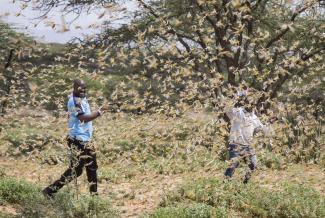Food insecurity
As in biblical times

According to the UN Food and Agriculture Organization (FAO), the current locust plague is the worst to have hit in 25 years. The multilateral agency warned in mid-October that recent rains have again created breeding grounds for locust swarms in Ethiopia and Somalia as well as across the Red Sea in Yemen.
The desert locust is a kind of short-horned grasshopper. It is the most destructive insect. In normal years, this species is found in deserts of Africa, the Middle East and Asia. However, heavy rainfalls make them thrive by causing the growth of atypically abundant vegetation in areas that are normally arid. When that happens, the insects stop living solitarily and form huge swarms. When several such swarms merge, experts speak of a plague.
In Kenya, no locust invasion was this devastating in 70 years. The largest swarm to hit the country this year covered 2,400 square kilometres and was made up of 200 billion locusts.
The pests destroy fields as well as wild-growth vegetation. Farmers struggle to cope, as fields are ravaged and feed for livestock as well as wildlife is destroyed.
In May, the FAO warned that 20 million people in East African countries were facing severe and acute food insecurity. Acute food insecurity means an increasing likelihood of famine. Millions of people see their savings depleted and livelihoods endangered.
Two of the East African countries concerned – Somalia and South Sudan – already had high burden of malnutrition before the locust plague started. Other countries are hardly faring better. The entire region is marked by high morbidity, weak health-care and insufficient infrastructure. Agriculture accounts for about half of the region’s economy and 70 % of livelihoods. Masses of people depend on traditional, low-productivity farming. Regional conflicts exacerbate problems, and so does the coronavirus pandemic.
The UN sees a strong link between global heating and the current locust problems, which similarly haunt parts of the Arab Peninsula and the Middle East. Wet weather has become more frequent, including cyclones. Unusually warm sea surfaces in the Indian Ocean have recently made storms more likely. Experts warn that what seems like “freak weather” today may actually be normal soon.
Locust swarms have been terrorising humankind since biblical times. Science and modern technology so far are unable to prevent such plagues. The current scale of infestation in East Africa is unprecedented.
It is difficult to predict when, where and with what force the next locust swarm will strike. A great challenge is that, even when a locust invasion is brought under control in one area, new swarms may build up in neighbouring ones. Wind speed and direction matter. The wind may even blow a swarm across the Red Sea.
For now, the only way to protect an area is heavy use of pesticides. Vast areas have been sprayed – and are being sprayed – this year. These chemicals are poisonous by definition and their side-effects on human and environmental health must not be ignored, though getting a grip on the insect infestation is certainly the more urgent issue.
In the long run, a multi-pronged approach is needed. It must include better forecasting, surveillance and early detection. Such efforts need to be coordinated across borders and include strife-torn areas, including in Yemen and Somalia. More-over, humankind must redefine its relationship with nature. Deforestation, intensive agricultural practices and overgrazing have all created open fields encouraging locust infestation. There is no silver bullet in the fight against locust outbreaks. It is clear, however, that some of the world’s least developed countries must rise to huge challenges.
Mahwish Gul is a consultant with a focus on development management. She lives in Nairobi.
mahwish.gul@gmail.com








